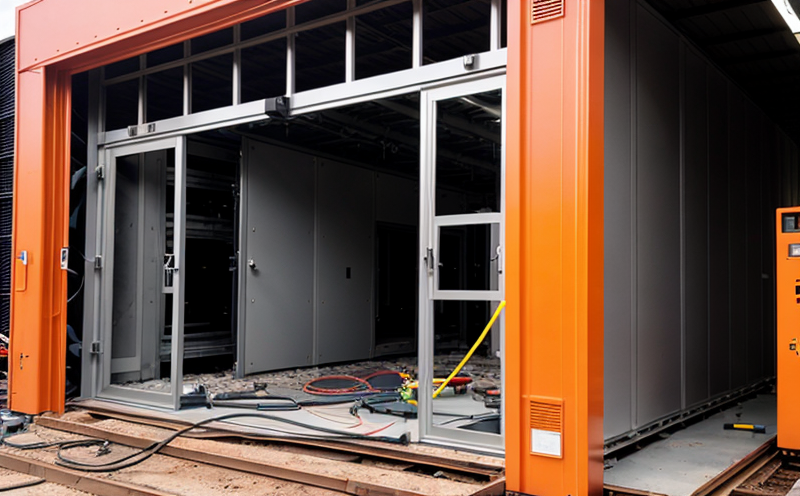SAE J2929 Thermal and Safety Testing of Lithium-Ion Batteries in EV Applications
The SAE J2929 standard is pivotal for the development, testing, and certification of lithium-ion batteries used in electric vehicle (EV) applications. This standard addresses critical aspects of battery safety and thermal management, ensuring that manufacturers can deliver reliable products while meeting stringent regulatory requirements.
Thermal runaway events in lithium-ion batteries are a significant concern due to their potential for rapid heating and subsequent fires or explosions. SAE J2929 provides comprehensive guidelines to prevent such incidents by testing the battery’s ability to withstand overcharging, external short circuits, internal shorts, mechanical abuse, and high-temperature conditions.
The standard is designed to cover both single cells and modules, ensuring that all components of a lithium-ion battery are subjected to rigorous thermal and safety tests. This includes evaluating the battery's performance under various stressors to ensure it can operate safely within its intended applications in EVs.
Testing according to SAE J2929 involves a series of controlled experiments aimed at simulating real-world conditions that might lead to thermal runaway. These tests are conducted using specific apparatus and procedures outlined in the standard, which ensures consistency and repeatability across different laboratories and manufacturers.
The acceptance criteria for successful completion of these tests are strictly defined by SAE J2929. A battery must pass all specified tests without exhibiting any signs of thermal runaway or catastrophic failure. This includes maintaining structural integrity, minimizing heat generation, and ensuring that the battery remains operational post-test.
Our laboratory adheres meticulously to the procedures outlined in SAE J2929, using state-of-the-art equipment and experienced personnel to ensure accurate and reliable test results. Our testing facilities are equipped with specialized chambers capable of simulating a wide range of environmental conditions, from sub-zero temperatures to extreme heat.
For single cells, tests include overcharge protection, internal short circuit resistance, external short circuit tolerance, and high-temperature storage capability. For modules, additional tests such as mechanical abuse (drop testing) and thermal cycling are performed. Each test is conducted with precision to ensure that the battery behaves predictably under stress.
Our testing process begins with thorough specimen preparation, where each battery or module undergoes a detailed examination to ensure it meets the necessary specifications before undergoing any tests. This includes checking for manufacturing defects, ensuring proper cell arrangement, and verifying thermal management systems.
The instrumentation used in our testing is top-of-the-line, designed specifically for SAE J2929 compliance. Our facilities are equipped with temperature-controlled chambers, high-precision voltage and current measurement instruments, and sophisticated data logging systems to record all test parameters accurately.
Reporting the results of these tests is a critical aspect of our service. We provide detailed reports that include not only the outcomes of each individual test but also an analysis of the battery's performance under various conditions. This information is invaluable for manufacturers looking to improve their products and ensure they meet regulatory requirements.
Our team of experts can assist with any questions or concerns you may have regarding SAE J2929 compliance. We are committed to providing high-quality, reliable testing services that help our clients achieve their goals in the EV battery market.
Industry Applications
- Electric Vehicle (EV) manufacturers ensuring compliance with regulatory standards
- Battery module developers improving product safety and performance
- R&D teams exploring new battery technologies and materials
- Regulatory bodies evaluating the safety of EV batteries in the market
Environmental and Sustainability Contributions
The SAE J2929 standard plays a crucial role in enhancing environmental sustainability by promoting safer and more reliable electric vehicle batteries. By reducing the risk of thermal runaway, these batteries contribute to minimizing the carbon footprint associated with transportation. Additionally, the testing procedures outlined in SAE J2929 help manufacturers identify and address potential safety issues early in the development process, leading to improved product quality and reduced waste.
Use Cases and Application Examples
In use cases such as electric vehicle manufacturing, SAE J2929 ensures that battery components are tested under realistic conditions. For example, during the development of a new EV model, manufacturers will conduct thermal and safety tests on both individual cells and complete modules to ensure they meet all regulatory requirements.





